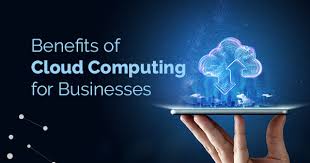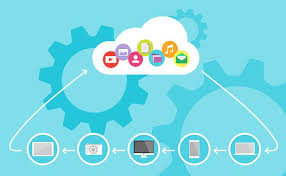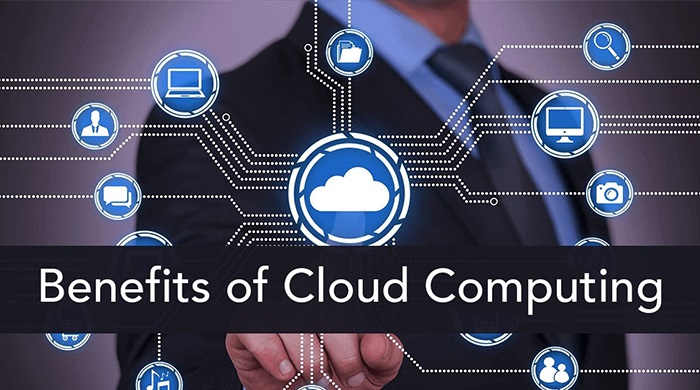Hello!
 Businesses today want to be more flexible and cost-effective. Cloud computing has become a viable option for nearly every business. Cloud computing is a network of remote servers that are accessible via standard web browsers and mobile apps.
Businesses today want to be more flexible and cost-effective. Cloud computing has become a viable option for nearly every business. Cloud computing is a network of remote servers that are accessible via standard web browsers and mobile apps.
It allows users to remotely store and exchange data, access software applications, and access files from any device with an internet connection. Individuals and businesses can also access their cloud data from any device or computer that is connected to the internet. This allows them to sync and transfer their files and settings wherever they are.
Cloud computing can offer many benefits to your business. These are 10 benefits that cloud computing can bring to your business.
Cloud Computing Benefits That Will Help Your Business
Security
 Cloud computing’s security is one of its greatest benefits. Cloud computing means that you won’t need to worry about data security.
Cloud computing’s security is one of its greatest benefits. Cloud computing means that you won’t need to worry about data security.
Cloud providers employ industry-standard security measures to protect your data, including firewalls and encryption.
If your company uses a private cloud, you can further customize the security settings for your business. Remotely disabling a device can be done by an employee if they lose or misplace it.
To protect your data against cyber threats, you can also encrypt it. Multi-factor authentication (MFA), which is used by businesses to further protect their data, can also be used. To log in to MFA, users must enter a unique passcode that is sent to their mobile phone.
Scalability
 Another benefit of cloud computing is its scalability. Cloud providers provide flexible cloud solutions that can be tailored to your business’s requirements.
Another benefit of cloud computing is its scalability. Cloud providers provide flexible cloud solutions that can be tailored to your business’s requirements.
To deal with unexpected spikes or seasonal traffic, you can adjust the system to meet demand. This lets you save money on upfront computing costs and allows your business the flexibility to adapt to changing demands quickly.
A trial period allows you to test out the cloud solution before you buy it. Cloud solutions allow you to easily upgrade or downgrade as your business grows.
This means you don’t need to purchase more computing power upfront and that your system doesn’t have to be upgraded again if you experience a slowdown in your business.
Mobility
 If your business depends on remote workers, cloud computing may be a great option to increase flexibility and mobility. Cloud solutions allow you to access your data from any device or computer connected to the internet and run your applications.
If your business depends on remote workers, cloud computing may be a great option to increase flexibility and mobility. Cloud solutions allow you to access your data from any device or computer connected to the internet and run your applications.
Employees can access their data anywhere they want, so they can work at home or in coffee shops. Cloud providers also offer many collaboration and communication tools that can be used with their services.
These tools can be used to communicate and collaborate with vendors and clients who don’t have access to your company data.
Cloud Computing Offers a Unique Advantage: Consistent Experience
 Cloud computing also offers consistency. Cloud computing is consistent. Different departments and people may use different software and devices. However, everyone will have the same experience.
Cloud computing also offers consistency. Cloud computing is consistent. Different departments and people may use different software and devices. However, everyone will have the same experience.
This avoids miscommunications and makes sure everyone is on the same page. Your business will enjoy a consistent experience regardless of whether you use Office 365 or Google G Suite, Salesforce, or any other cloud service.
You can also access information from multiple applications using tools such as identity integration without having to switch between them.
Cloud Computing Offers The Greatest Benefit: Lower Costs
 Cloud solutions offer significant cost savings over the long term compared with other IT solutions. Cloud solutions can help you save money on software, hardware upgrades, and software licensing, while also allowing you to be flexible and scalable.
Cloud solutions offer significant cost savings over the long term compared with other IT solutions. Cloud solutions can help you save money on software, hardware upgrades, and software licensing, while also allowing you to be flexible and scalable.
Cloud providers take care of all maintenance and upgrades so that you don’t need to keep up with IT trends.
Cloud solutions can offer significant cost savings over the long term compared with other IT solutions. Cloud solutions can help you save on hardware and software upgrades as well as provide a flexible, scalable solution.
Unlimited Storage
 Cloud storage offers unlimited storage unlike other data storage options like on-premise computers. You can reduce the storage you use for your data by scaling down your cloud solution, but you can always increase it later.
Cloud storage offers unlimited storage unlike other data storage options like on-premise computers. You can reduce the storage you use for your data by scaling down your cloud solution, but you can always increase it later.
A hybrid solution can be used to store some data locally and other data in the cloud.
Perform faster
Another benefit of cloud computing is faster performance. Cloud computing is also more flexible than traditional hardware and allows you to scale your systems.
This means your website and other business applications will run faster without the need to upgrade their hardware.
A hybrid solution can be used to increase your performance. It allows you to keep your most important data close at hand while allowing you to access other data in the cloud.
Better Collaboration
Cloud solutions allow you to share information online with vendors and clients. Collaboration tools such as blogs, wikis, and forums can be used to collaborate with your team members and manage projects.
 Collaboration tools can be used to communicate with vendors and clients who do not need access to your company data. These tools allow you to share documents, collaborate on tasks and manage your workflow all from one platform.
Collaboration tools can be used to communicate with vendors and clients who do not need access to your company data. These tools allow you to share documents, collaborate on tasks and manage your workflow all from one platform.
Disaster Recovery
Control is an important aspect of any company’s success. However, you can’t control certain things. No matter how well your company controls its procedures, there are some things you cannot control. Even a slight downtime can have a huge impact on your business in today’s competitive market.
Downtime in business can lead to a loss of productivity, revenue, or reputation. You can speed up your recovery, even though you cannot prevent all disasters. Cloud-based data recovery services offer quick recovery in emergency situations such as natural disasters or electrical outages.
Also read:
- Why is Becoming Marketing More Difficult?
- How Automation can help Your Business Grow
- How To Keep Your Personal Finances From Affecting Your Business
Conclusion
 Cloud computing offers many benefits that make it an attractive option for nearly every business. Cloud computing offers many benefits that will help you to streamline your workflow, improve performance, and work more efficiently.
Cloud computing offers many benefits that make it an attractive option for nearly every business. Cloud computing offers many benefits that will help you to streamline your workflow, improve performance, and work more efficiently.
Thank you!
Join us on social networks!
See you!






